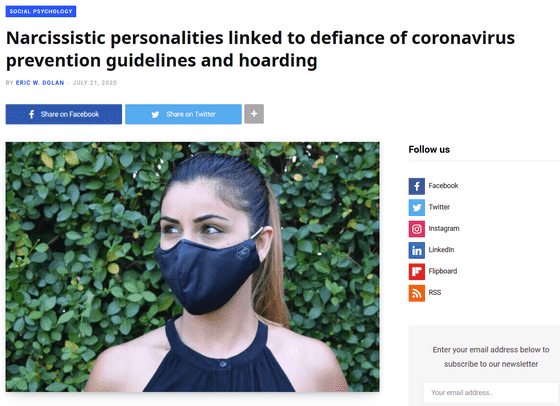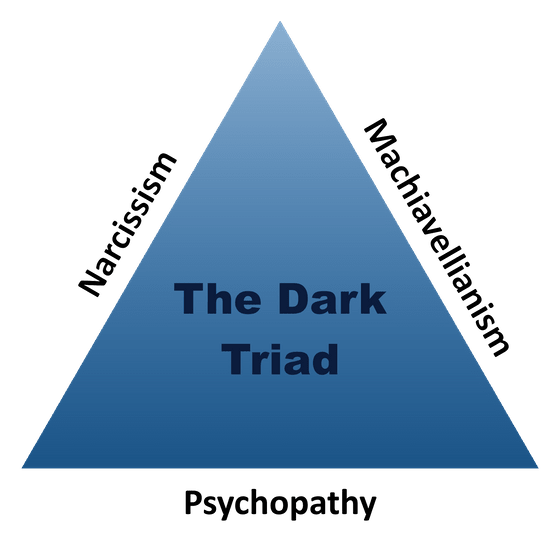Research highlights the appearance of people who can/can't prevent new corona, such as 'more highly cognitive people keep social distances'

Since the new coronavirus infectious disease (COVID-19) has become a global threat, many people have been keeping a social distance and striving to wash their hands and wear masks thoroughly. Some people, such as resulting in a ladder the restaurant to say, such as 'I'll sprinkle the virus' after being diagnosed with COVID-19-positive
Working memory capacity predicts individual differences in social-distancing compliance during the COVID-19 pandemic in the United States | PNAS
https://www.pnas.org/content/117/30/17667
Lower working memory capacity linked to non-compliance with social distancing guidelines during the early stage of the coronavirus outbreak
https://www.psypost.org/2020/07/study-lower-cognitive-ability-linked-to-non-compliance-with-social-distancing-guidelines-during-the-coronavirus-outbreak-57293
Adaptive and maladaptive behavior during the COVID-19 pandemic: The roles of Dark Triad traits, collective narcissism, and health beliefs-ScienceDirect
https://www.sciencedirect.com/science/article/pii/S0191886920304219
Narcissistic personalities linked to defiance of coronavirus prevention guidelines and hoarding
https://www.psypost.org/2020/07/narcissistic-personalities-linked-to-defiance-of-coronavirus-prevention-guidelines-and-hoarding-57230

In March 2020, it was found that 'a
Therefore, a research team of Weizhen Xie and others working at the National Institutes of Health investigated the relationship between social distance keeping behavior and individual cognitive ability in 850 American residents. During the two weeks after the National Emergency Declaration was issued in the U.S. on March 13, 2020, the survey evaluated whether the subject complied with social distance guidelines and the working memory of the subjects. .. Working memory is the ability to act while temporarily holding information, and is also called the working area.
As a result of Xie et al.'s analysis of the practice status of working memory and social distance of the target person, it was found that 'the more working memory the person has, the stronger the tendency to follow the guidelines for keeping the social distance.' The researchers conclude from the result, 'People with a large working memory tend to think that the benefits outweigh the costs of social distance.'
Regarding the relationship between working memory and COVID-19 countermeasures, Mr. Xie said, 'Determining whether or not to follow the social distance guidelines depends on the public interest such as reducing the burden on public health and the personal benefit such as loss of social connection. It's a tough sacrifice, and the ability to make decisions on these challenges depends on your mental capacity to keep multiple pieces of information in your head, your working memory.' States.
On the other hand, co-author of the paper, Weiwei Zhang, said: “There are no doubt that many factors that we did not include in our research affect our behavior on social distances. whether, simplification, such as to be directly linked to cognitive ability, such as the capacity of the working memory can not be admitted, and inappropriate is, ' said , only the working memory has emphasized that only one of the factors.

While the relationship between high cognitive ability and the practice of social distance efforts has become clear, we are also seeing trends for people who are uncooperative in these efforts.
Public universities and is of Polish
The Dark Triad is a ' self-love tendency ' that involves vanity and unrealistic superiority, ' Machiavellism ' that tries to manipulate others and shows indifference to coldness and morality, and lack of conscience and empathy. It is a collective term for the three personality characteristics of ' psychopathy ' that can be seen.

by Matinee71
When Zemojtel-Piotrowska and his colleagues actually conducted an analysis of 755 Polish residents in the dark triad diagnosis and COVID-19 infectious disease prevention behavior and buying-out questionnaire, they found that ``A high score was obtained in the dark triad diagnosis. Those who record are less likely to take preventive actions, but more likely to buy them up.'
Regarding the results of this research, the research team said in a paper, ``The result that people with the characteristics of the dark triad were less likely to take preventive actions, but tended to run for buy, it was impulsive. In line with previous findings that they are selfish and more prone to risk: those with the Dark Triad trait take precautions while paying attention to the negative aspects of preventive behavior. It seems that the benefits are not taken into account.'
On the other hand, the research team pointed out as a limitation of the research, 'This research is only a research conducted in a single cultural area where the influence of COVID-19 is not so serious and is materially rich.' He pointed out that more research is needed to generalize the results of this study.
Related Posts:
in Science, Posted by log1l_ks







